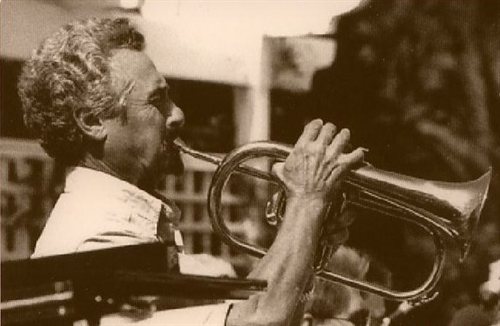Milton Rajonsky, a Great Barrington, Massachusetts native, was one the main creators of West Coast Jazz. He was a flugelhorn player and an arranger. Rogers began his career as a professional musician working with Red Norvo and Will Bradley. He worked extensively with Woody Herman from 1947 to 1949. In 1950 and 1951, he also played with Stan Kenton. Rogers was also featured on the 1954 Shelly Manne album The Three and the Two with Jimmy Giuffre. Many of the music that Rogers recorded with Giuffre showcased his experimental side. This resulted in avant-garde jazz at its earliest stages. Art Pepper and Andre Previn were also among his notable recordings. Rogers recorded a number of RCA Victor albums from 1953 to 1962 (later reissued on the Bluebird label), as well as Atlantic albums with Shorty Rogers, his own group, Shorty Rogers, and His Giants. These albums included Shorty Courts, The Count (1954), The Swinging Mr. Rogers (1955), Martians Come Back (1955), which is a reference to Rogers’ song “Martians Go home”, which he had written and performed earlier that year on The Swing Mr. Rogers. Some of his most avant-garde music was included on these albums. They could be considered “cool” jazz to a certain extent, but they also referred back to the “hot” style of Count Basie who Rogers always credited with being a major influence. Rogers is credited with the composition of music for UPA’s Mr. Magoo cartoon Hotsy Footsy, and the Looney Tune Three Little Bops. He became more well-known for his abilities as an arranger and composer than he was for his trumpet playing. The 1958 Peter Gunn TV Series episode features The Frog Shorty playing flugelhorn while Lola Albright sings How High the Moon At Mother’s. Rogers quit playing trumpet in the 1960s and remained out of the jazz scene for many more years. He also composed and orchestrated a number of records for The Monkees (including Daydream Believer), in the late 1960s. In the 1970s, he wrote the jazzy background music to TV’s The Partridge Family’s first season. Starsky’s fourth season, he also wrote episode scores.
